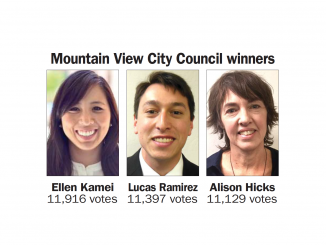
BY ALLISON LEVITSKY
Daily Post Staff Writer
Amid an apparent cultural divide over city-licensed marijuana sales in Mountain View, Vice Mayor Margaret Abe-Koga has accused two former mayors who support legal pot stores of making racist assumptions about the largely Chinese group of residents who oppose them.
Dozens of people spoke against legal pot at City Council on Tuesday night (March 5), claiming the stores would make cannabis more easily accessible to kids, leading to pot addiction, harder drug use, dangerous driving and more property crime.
A large number of the stores’ opponents — though not all — appeared to be recent Chinese immigrants.
Former Mayor Ken Rosenberg noted that some pot opponents were not Mountain View residents, an observation that Abe-Koga said was a racist assumption.
Supporters of the pot stores have also cautioned the council from listening to the “vocal minority” of the largely Chinese opponents.
“If 50 white people show up to talk about housing, we say, ‘Oh, that was a lot of people,’ and we listen to them,” Abe-Koga said. “But if we have 300 Asian people show up, why is there this question about whether they live here or if they’re a minority or not?”
And former Mayor Lenny Siegel mentioned at the meeting a Chinese-language flyer that the political group BetterMTV circulated during the election.
The flyer claimed that then-candidates Ellen Kamei and Alison Hicks would “propose limiting” the stores, even though neither made any public statements about this during the election.
After Siegel mentioned the flyer while speaking to council, he stopped to tell Abe-Koga, “Don’t smirk at me.”
When it was Abe-Koga’s turn to speak later, she responded to Siegel.
“I wasn’t smirking. I was glaring because I’m very upset about this. This is not a racial issue, and somehow it’s been made to be,” Abe-Koga said. “Asian folks who came and spoke — they should not have to say, ‘Well, I’m part of the Chinese-American community, but I support it, or I’m against it.’ We don’t expect the white people to come up and say that.”
Abe-Koga also criticized Siegel for publicly suggesting on a Silicon Valley Council of Nonprofits panel on marijuana last month that some Chinese immigrants’ resistance to pot may be connected to their knowledge of the Opium Wars.
The Opium Wars
The Opium Wars were two 18th-century wars over the British opium trade that got millions of Chinese addicted to opium, devastating the country’s large coastal cities and contributing to the Western powers’ subjugation of the Chinese.
“When a former council member asked me, ‘Why do Asian people oppose pot?’ I didn’t know how to answer that, to be honest,” Abe-Koga said at council Tuesday. “And then when I hear that same council member at a public forum saying, ‘Asian people are against pot because of the Opium Wars,’ um, that’s a real problem to me.”
Abe-Koga said she had to ask her teenage daughter what the Opium Wars were. In an interview with the Post, Siegel criticized Abe-Koga’s ignorance, as an elected official, of historic events that still inform U.S.-China foreign trade relations.
“I think Americans, whether they’re Asian or not, should learn about the history about the plundering of China,” Siegel said. “Americans have a very short view of history.”
Lumping groups together
Siegel also said he thought Abe-Koga used the word “Asian” rather than “Chinese” to refer to the pot opponents in order to build solidarity with them as a Japanese-American and gain political advantage.
And Siegel strongly disagreed with Abe-Koga’s implicit accusation that his comments were racist.
Siegel said that after he became aware of some Chinese residents’ mounting opposition to the pot store ordinance, he wanted to understand where their strong anti-marijuana sentiment originated. So he started asking people about it, particularly Chinese-Americans.
One common theory was that some Chinese immigrants strongly oppose marijuana use because they associate it with the Opium Wars. Siegel mentioned this to an audience of 100 or 200 at the Silicon Valley Council of Nonprofits Health and Housing Summit on Jan. 18.
“I said nothing to indicate that I didn’t think that Chinese immigrants had a right to tell us what they thought. It was a matter of trying to understand them,” Siegel said. “I see no problem in asking questions about the racial implications of drug use and drug suppression.”
Opium Wars-marijuana connection
In fact, one of his co-panelists was San Jose State sociologist William Armaline, Siegel said. Armaline spoke about how marijuana law had been used to oppress African-Americans, citing Michelle Alexander’s 2010 book “The New Jim Crow: Mass Incarceration in the Age of Colorblindness.”
And, Siegel said yesterday, the connection between the memory of the Opium Wars and Chinese marijuana resistance has been recognized in Chinese media.
In January 2017, China Daily’s chief Washington correspondent, Chen Weihua, drew the same connection in an editorial.
Chen wrote that marijuana legalization in some U.S. states — along with greater cultural acceptance of the drug’s use — was “puzzling” to many Chinese tourists.
“This is quite a contrast to the fact that most people in China still associate drugs with the country’s bitter Opium War in the mid 19th century, a war forced upon it by the British to legalize its opium trade in China,” Chen wrote.




The Left weaponized race and now are using against themselves. The Opium Wars reference is a red herring. Recent Chinese immigrants are not as socially liberal as the American Bay Area Left would like. Their 1960’s were a bit different than the Red Daiper Babies of America. If this is any indication, there will be a conservative wave when they gain citizenship and their children become voting age.